What is an AI Knowledge Base? A Complete Guide
AI knowledge bases are smart information hubs using AI to manage and deliver answers to users. It means they can understand user intent, even with vaguely phrased questions.
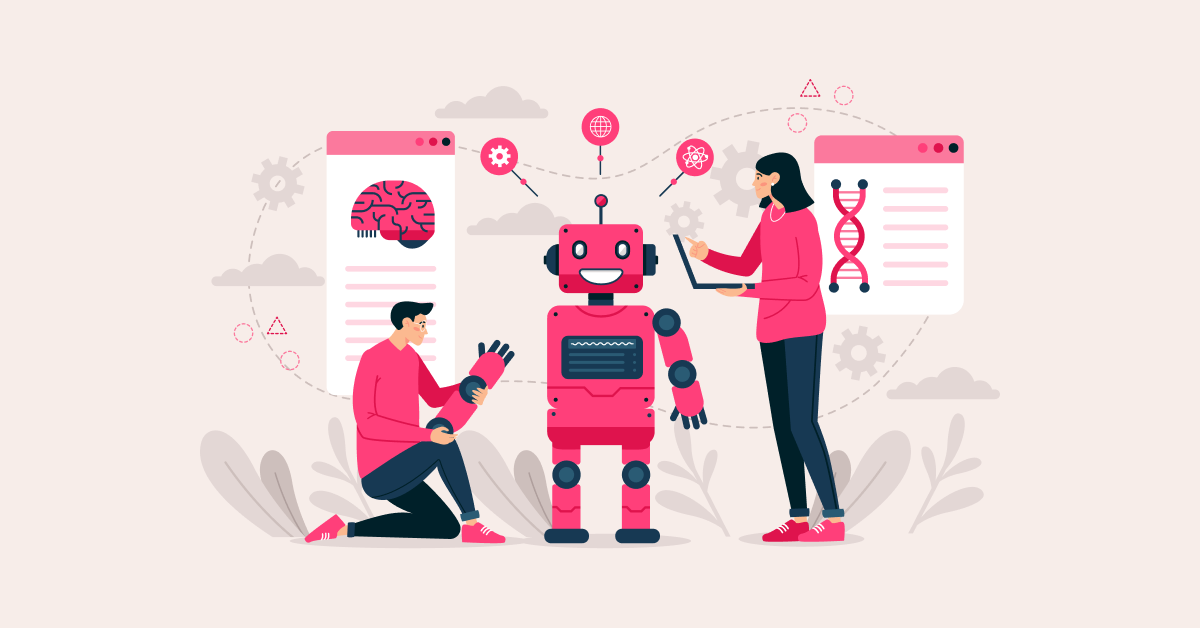
AI knowledge bases are smart information hubs using AI to manage and deliver answers to users. It means they can understand user intent, even with vaguely phrased questions.

Ever wondered how artificial intelligence (AI) can process and understand vast amounts of information? The answer lies in artificial intelligence knowledge bases. It is essential for enabling intelligent systems to make informed decisions and predictions.
Knowledge bases are like digital libraries of information that AI systems can access to understand the world around them. The knowledge bases store structured facts, concepts and relationships for easy navigation. 88% of customers expect a company to have an online self-service knowledge base.
The article explores the importance of AI knowledge bases in the development and functionality of intelligent systems. We will also discuss how the knowledge bases are created and utilized to enhance the capabilities of AI technology. So, if curious to know, read on to learn more about AI-powered knowledge bases.
An AI knowledge base can be defined as a centralized digital repository where companies store and organize information to help both customers and support teams find answers quickly. Think of it as a smart library that learns from every interaction and gets better at providing the right information at the right time. Unlike traditional FAQs, it uses artificial intelligence to understand context and deliver personalized responses.
Using natural language processing, the system analyzes incoming questions and matches them with relevant content from its database. When a customer asks about billing issues, the AI instantly pulls up related articles, previous solutions and step-by-step guides. It learns from successful interactions and continuously improves its ability to provide accurate answers without human intervention.
Key objectives:
Let us go through the key benefits of AI knowledge bases that can help your business reach new heights.
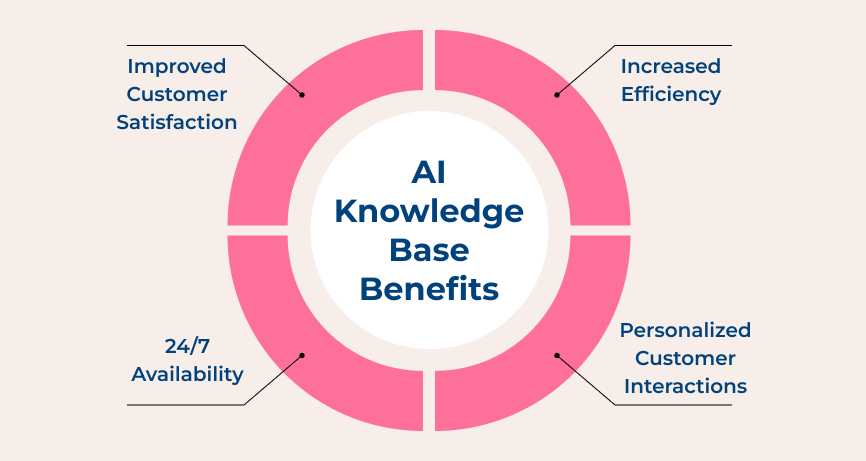
One of the main benefits of an AI knowledge base is that it allows customers to find the information they need quickly. Providing instant access to relevant answers can significantly improve customer satisfaction levels. Companies that offer a knowledge-based solution have seen a 20% increase in customer satisfaction.
AI knowledge bases allow for handling numerous customer inquiries at once, enabling human agents to tackle complex tasks. It leads to faster response times and improved efficiency shortening customer service wait times. Businesses can streamline their support processes and better manage peak service periods without compromising quality.
Customers have access to support round the clock, with an AI-powered knowledge base regardless of time zones or business hours. It ensures that customers can get answers to their questions at any time. Businesses can provide consistent and reliable support, even outside of traditional working hours.
AI knowledge bases can leverage customer data and preferences to provide personalized responses. Analyzing customer behavior can offer tailored solutions that meet individual needs and enhance the experience. The personalized approach helps to build stronger customer relationships and drive loyalty.
Below are the essential components that form the backbone of AI knowledge bases, shedding light on the forces that drive AI intelligence today.
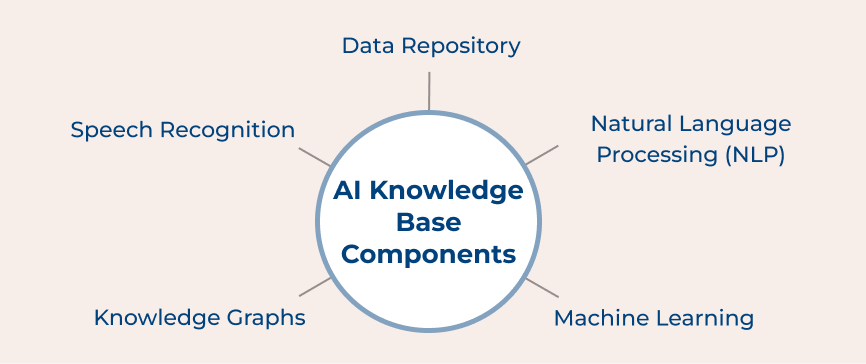
The data repository is where all the information, data and knowledge is stored within the AI knowledge base. It includes text, images, videos, documents and more. The data repository is important because it serves as the foundation for the knowledge base. It also allows the AI system to access and retrieve information quickly.
Natural Language Processing is the component of AI that allows the system to understand and interpret human language. NLP is essential for AI knowledge bases as it allows natural processing and responses to user inputs. Chatbots use NLP to understand user queries and provide relevant answers or solutions.
Machine Learning is a subset of AI that allows the system to learn from data and improve over time. Machine learning algorithms enable the AI knowledge base to analyze patterns and make data-driven decisions. Let’s assume that an AI-powered knowledge base for an e-commerce platform uses machine learning. It helps them to recommend products based on a user’s browsing history and preferences.
Knowledge graphs organize information in a structured format, linking data points and relationships between them. The component is crucial for an AI knowledge base. It helps the system to navigate and connect information effectively. Let’s consider an AI-powered knowledge base for a healthcare provider. It may use graphs to map out relationships between symptoms, diagnoses and treatment options.
Speech recognition allows the AI system to understand and transcribe spoken language. It is essential for AI knowledge bases that offer voice-enabled search. Virtual assistants like Siri or Alexa use speech recognition to process vocal commands.
Below are the various kinds of knowledge bases that empower AI systems, shedding light on how they work and why they matter.
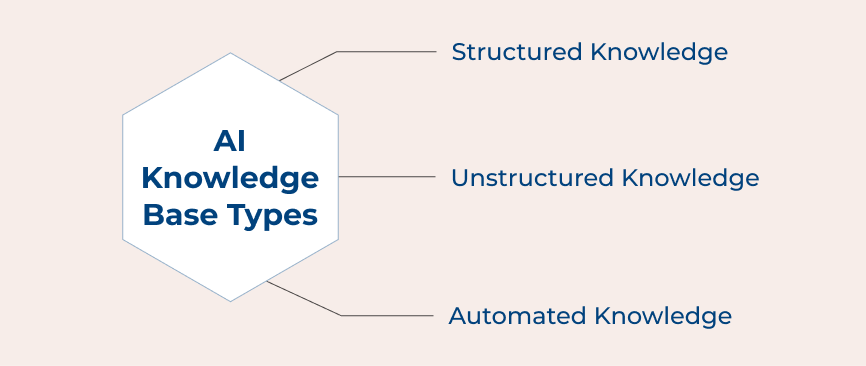
Structured knowledge refers to information that is organized in a predefined format, such as tables, graphs, or lists. It is easy for AI systems to interpret because the data is already categorized and labeled. Examples of structured knowledge in an AI knowledge base include product specifications, customer demographics and pricing information.
Unstructured knowledge is important for AI systems. It allows them to analyze complex information from various sources. AI systems can extract insights, detect sentiment and identify trends using unstructured knowledge in the knowledge base. Let’s assume that a social media monitoring AI system can analyze unstructured data from Twitter feeds. It helps them to track customer sentiment and identify potential issues before they escalate.
Automated knowledge refers to information that is generated in real time by AI systems through machine learning algorithms. It is dynamic and continuously updated based on new data. Automated knowledge in an AI-driven base includes predictive analytics and chatbots.
Following are the effective steps to create a robust AI knowledge base that will elevate your customer service experience and optimize your support operations.
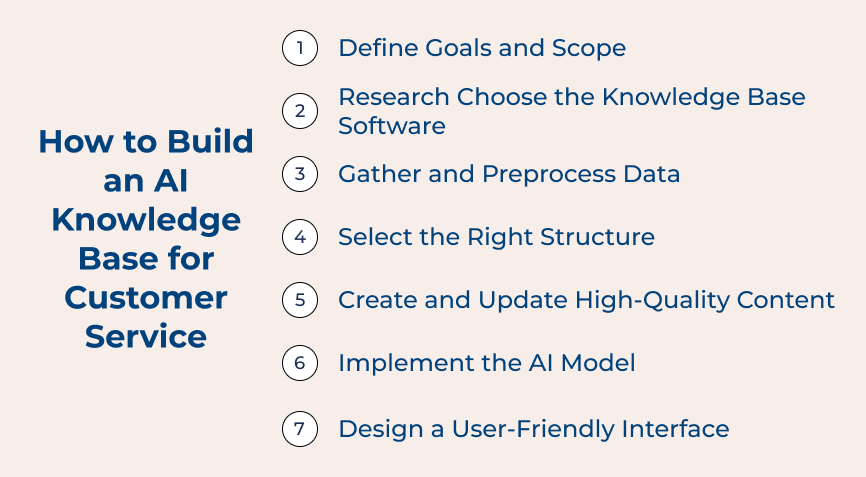
When building an AI knowledge base for customer service, defining goals and scope is a crucial step in the process. The step involves setting clear objectives for what the business wants to achieve with the knowledge base. It also helps in determining the scope of the information and services it will provide. Clearly outlining the objectives can ensure that the AI system is focused on delivering the right information.
Let’s assume that a company is looking to implement an AI base for customer service. It may set a goal of reducing customer service response times by 50% within six months. The knowledge base may cover FAQs, troubleshooting guides and product information.
Ways to implement:
Building an AI knowledge base for customer service is crucial for providing efficient and personalized support to users. One of the key steps in the process is researching and choosing the right knowledge base software.
Choosing the right knowledge base software is crucial as it forms the core of the AI-driven customer service platform. The chosen software should have features that support the creation, organization and retrieval of knowledge. It should also offer customization options, integration and analytics to track performance and engagement.
Ways to implement:
Gathering and preprocessing data is a crucial step in building an AI knowledge base for customer service. It involves gathering relevant data from different sources and structuring it for AI system use. The step is crucial as data quality directly affects AI system accuracy. Without relevant data, the AI system may provide incorrect information to customers.
A common use case for gathering data for customer service AI is creating a knowledge base of frequently asked questions (FAQs). Gathering data, including inquiries and past interactions, helps create a database for AI to quickly respond to customer queries.
Ways to implement:
When building an AI knowledge base for customer service, selecting the right structure is a crucial step. It ensures that the information is easily accessible and relevant for customers. The step involves organizing the data in a logical and user-friendly way. It directly impacts the effectiveness of the knowledge base.
A well-structured knowledge base makes it easier for customers to find the information they need quickly. It reduces the need for human intervention and improves overall customer satisfaction. One use case for implementing the step is in an e-commerce platform. Customers can access product information like sizing charts, care instructions and reviews through a categorized knowledge base.
Ways to implement:
Creating and updating high-quality content is a crucial step in building a knowledge base for customer service. The step involves consistently producing valuable and relevant information for customers to access. The importance lies in the fact that AI systems rely on accurate and up-to-date information to provide effective customer service.
One use case for the step is a company implementing an AI-powered chatbot for customer service. The chatbot relies on the information stored in the knowledge base to respond to inquiries. If the content is outdated, the chatbot may provide incorrect information. It leads to customer frustration and dissatisfaction.
Ways to implement:
Implementing an AI knowledge base is a crucial step in building an efficient and effective customer service system. The key is to promptly and accurately address customer inquiries to enhance their brand experience.
Utilizing a knowledge base can streamline customer service processes, reduce response times and increase customer satisfaction. One use case for implementing a knowledge base is in a chatbot system. AI-powered chatbots can access knowledge to offer real-time solutions without human intervention.
Ways to implement:
Designing a user-friendly interface is a crucial step in building an AI knowledge base for customer service. A knowledge base is an information repository accessed by AI to provide accurate answers to customer queries. The knowledge base includes a user interface that affects customer interaction ease.
A user-friendly interface ensures that customers can easily find the information they are looking for, leading to improved satisfaction. Let’s consider that a customer has a question about a product or service. A well-designed user interface can simply type in their query and receive an instant response from the AI system, saving them time.
Ways to implement:
Check out the key differences of AI knowledge base vs traditional knowledge base to help you understand which solution best fits your needs.
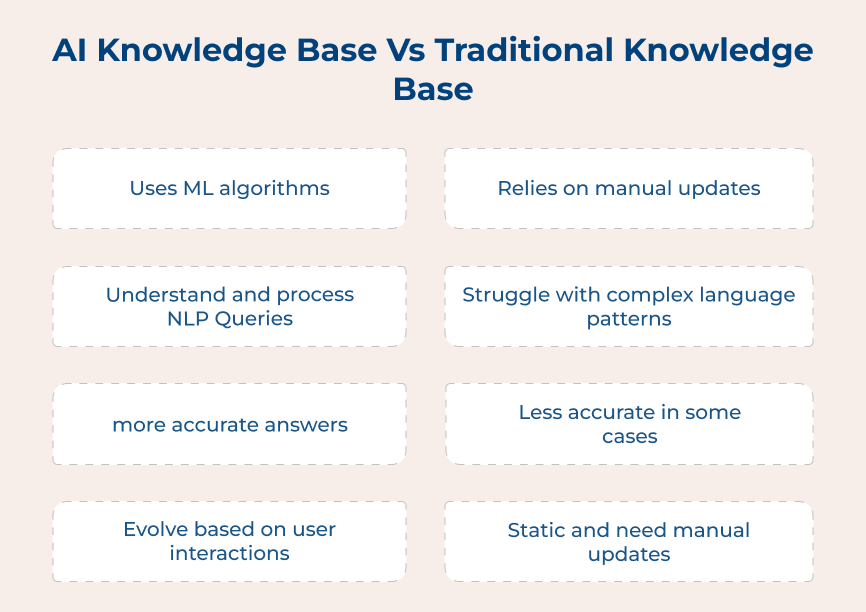
AI knowledge bases utilize machine learning algorithms to automatically update the information stored within them. The automation allows for faster and more accurate responses to user queries. The AI system can learn from past interactions and continuously improve its knowledge base.
Traditional knowledge bases rely on manual updates and maintenance by human agents. The process can be time-consuming and prone to errors. It requires constant attention to keep the information accurate and up-to-date.
AI knowledge bases can personalize responses to individual users based on their past interactions with the system. AI can tailor its responses to match the specific needs of each user, by analyzing user behavior and preferences. It provides a more personalized and effective support experience.
Traditional knowledge bases offer a more one-size-fits-all approach to information management. Users can search and access information, but personalization is limited compared to knowledge bases.
AI knowledge bases are highly scalable and able to handle a large volume of user queries. The AI system’s ability to store and retrieve information expands as it improves. It allows it to handle an increasing number of users and queries without sacrificing speed or accuracy.
Traditional knowledge bases may struggle to scale effectively, particularly as the volume of information and queries grows. Without automation, traditional knowledge bases may struggle to handle increased workload efficiently.
AI knowledge bases can predict user needs and provide proactive support before users even ask for it. AI can predict user needs by analyzing behavior patterns. It saves time by offering information proactively.
Traditional knowledge bases are more reactive, responding to user queries only when they are initiated. While users can still access the information they need, they must first search for it themselves rather than receive it proactively.
Below are the leading AI knowledge base platforms that are redefining the way companies handle their critical information and customer interactions.
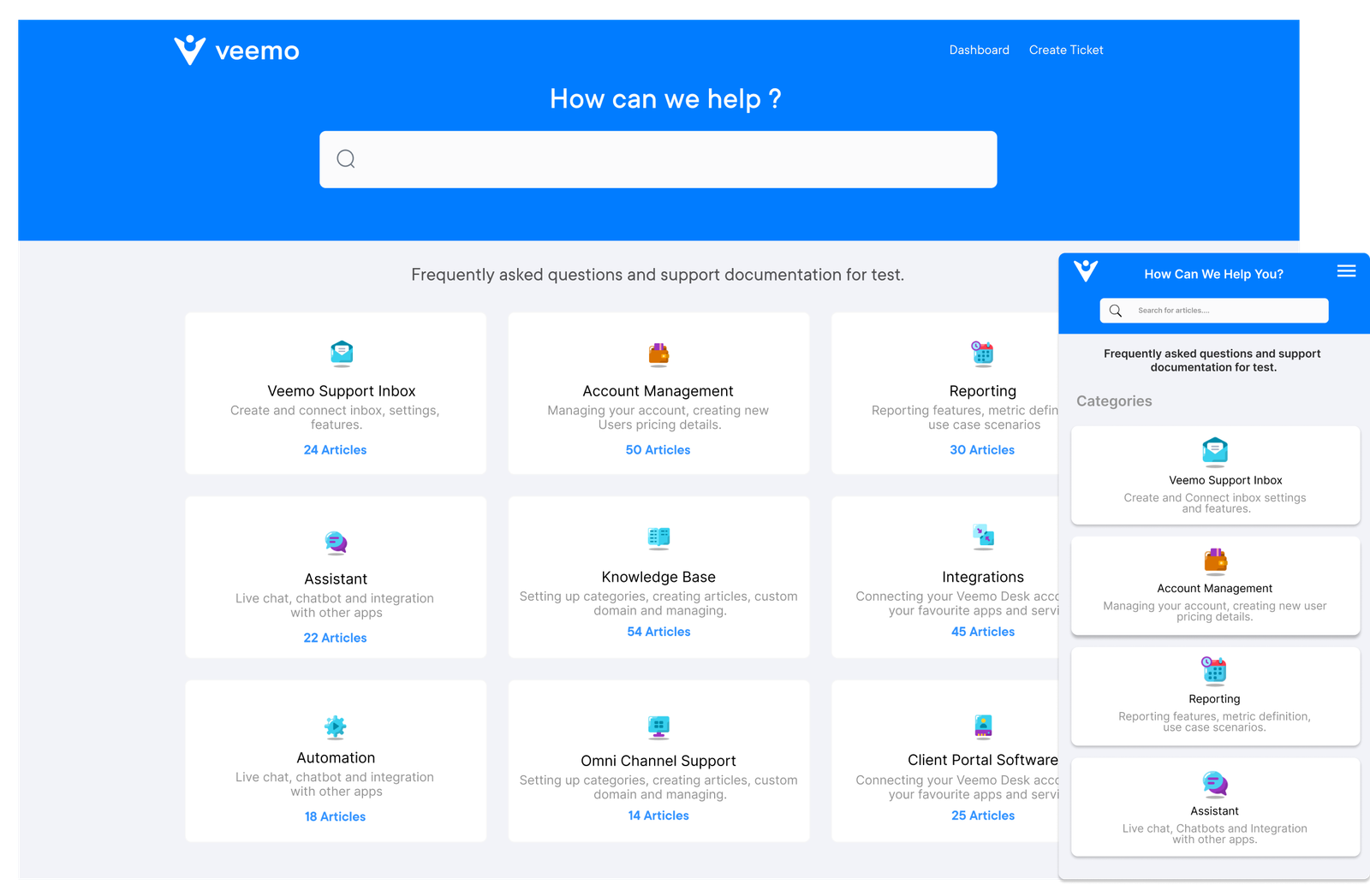
Veemo is a cutting-edge help desk platform that offers an AI-powered knowledge base to help businesses streamline customer service. It merges AI with a user-friendly interface for managing customer inquiries and providing real-time accurate information.
Key features:
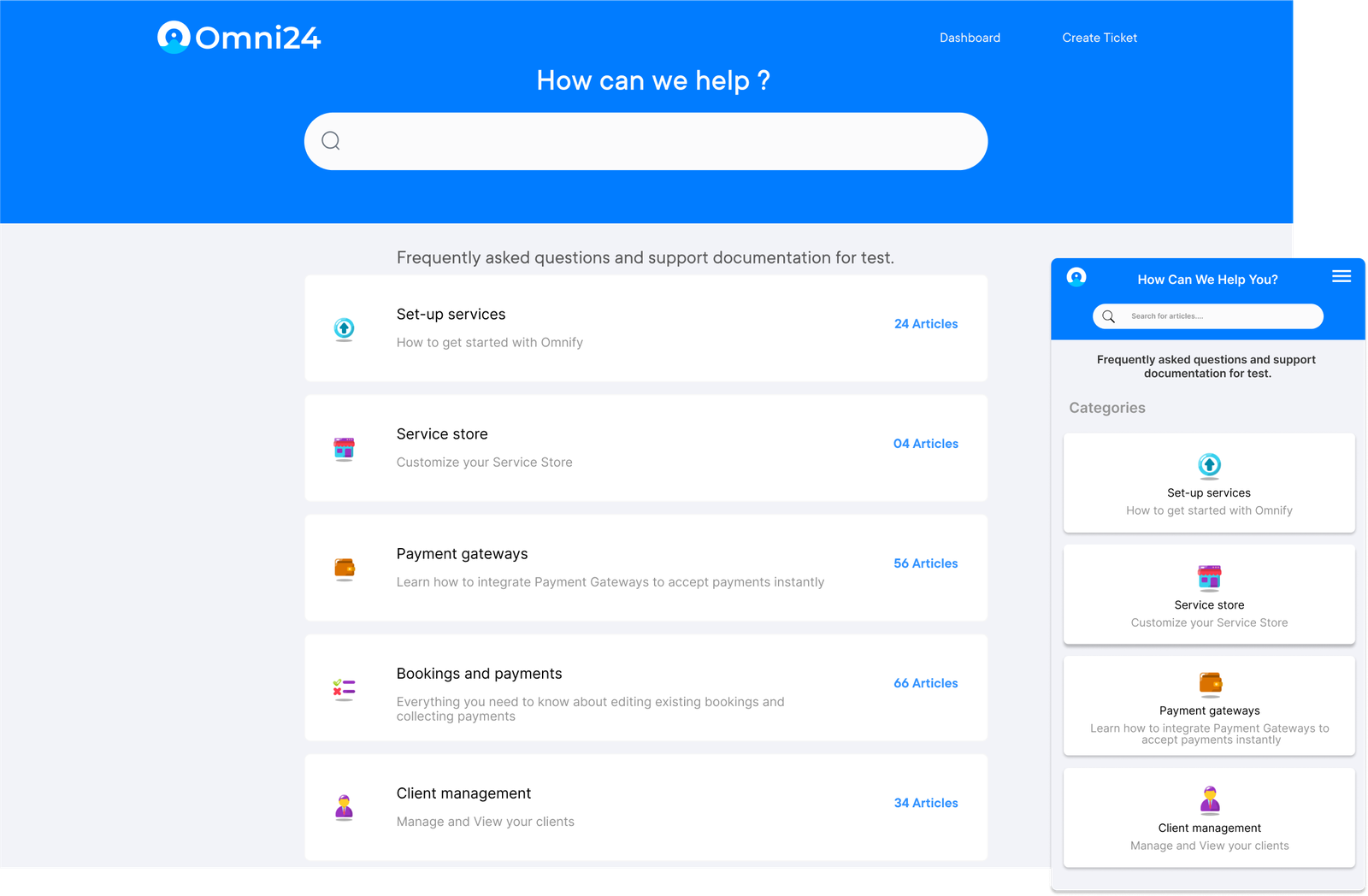
Omni24’s knowledge base is powered by artificial intelligence, which means it is constantly learning and improving over time. It helps businesses provide faster responses to customer queries, improving customer satisfaction. The knowledge base can be easily integrated with other Omni24 products. It involves live chat and chatbots, to provide a seamless customer experience.
Key features:
Zendesk Guide is a popular knowledge base platform that uses AI. It helps businesses create, manage and optimize their knowledge bases. The platform offers features such as AI-powered search capabilities, content recommendations and analytics. Businesses can create a seamless and intuitive knowledge base with Zendesk Guide. It allows employees and customers to find the information they need quickly.
Implementing our AI knowledge base can help you truly transform your business. It can streamline processes, improve efficiency and enhance customer satisfaction. An organization can rapidly analyze extensive data using advanced machine learning algorithms. It leads to better decision-making and strategic planning.
Utilizing the power of AI can drive business growth for the business, stay ahead of the competition to stand out and adapt to evolving market trends. Don’t wait any longer – unlock the potential of AI technology and take the business to the next level.
An AI knowledge base is necessary because it provides a centralized and easily accessible repository of information. It can help automate customer support, improve decision-making and enhance productivity. Having a knowledge base powered by AI can ensure organizations stay competitive and efficient.
Before adopting AI knowledge bases, organizations need to have a clear understanding of their data sources. A solid data management strategy and a team with the necessary technical skills to implement the AI system is crucial. Organizations should have a well-defined business problem that can be solved through the use of knowledge bases.
AI knowledge bases are incredibly powerful tools but they do have limitations. It may involve lack of context, frequent updates and bias in the information. Knowledge bases may not fully grasp complex concepts requiring human understanding.
Organizations managing the transition to AI knowledge bases must first assess their current systems and determine the best approach. They should invest in AI training for employees and ensure data integrity for accurate results. Collaboration between IT and business teams is crucial for successful implementation. It is an ongoing monitoring and adjustment to optimize performance.
An AI-powered knowledge base can help a team by providing instant access to information and solutions, increasing productivity. It can also streamline onboarding processes and empower employees to make informed decisions. The team can easily search for and retrieve relevant data. It also helps to collaborate effectively and stay up-to-date with the latest information in AI technology.

Market better, sell faster and support smarter with Veemo’s Conversation Customer Engagement suite of products.
Unify all your customer data in one platform to deliver contextual responses. Get a 360 degree view of the customer lifecycle without switching tools.
Connect with the tools you love to reduce manual activities and sync your business workflows for a seamless experience.
 https://veemo.io/wp-content/uploads/2025/12/customer-connection.png
1256
2400
Indrasish Singha
https://veemo.io/wp-content/uploads/2024/11/veemo.svg
Indrasish Singha2026-02-06 09:11:372026-01-19 09:14:05What is Customer Connection: Mistakes, Metrics & Examples
https://veemo.io/wp-content/uploads/2025/12/customer-connection.png
1256
2400
Indrasish Singha
https://veemo.io/wp-content/uploads/2024/11/veemo.svg
Indrasish Singha2026-02-06 09:11:372026-01-19 09:14:05What is Customer Connection: Mistakes, Metrics & Examples https://veemo.io/wp-content/uploads/2025/12/complaint-management.png
1256
2400
Indrasish Singha
https://veemo.io/wp-content/uploads/2024/11/veemo.svg
Indrasish Singha2026-02-03 09:04:022026-01-19 09:10:02What is Complaint Management? Importance, Key Steps & Strategies
https://veemo.io/wp-content/uploads/2025/12/complaint-management.png
1256
2400
Indrasish Singha
https://veemo.io/wp-content/uploads/2024/11/veemo.svg
Indrasish Singha2026-02-03 09:04:022026-01-19 09:10:02What is Complaint Management? Importance, Key Steps & Strategies https://veemo.io/wp-content/uploads/2025/12/AI-Self-Service.png
1256
2400
Indrasish Singha
https://veemo.io/wp-content/uploads/2024/11/veemo.svg
Indrasish Singha2026-01-26 09:52:482026-01-13 10:17:07What is AI Self Service? Benefits, Key Metrics and Best Practices
https://veemo.io/wp-content/uploads/2025/12/AI-Self-Service.png
1256
2400
Indrasish Singha
https://veemo.io/wp-content/uploads/2024/11/veemo.svg
Indrasish Singha2026-01-26 09:52:482026-01-13 10:17:07What is AI Self Service? Benefits, Key Metrics and Best PracticesGrow Customer Relationships and stronger team collaboration with our range of products across the Conversational Engagement Suite.

 How to Improve Online Customer Service? 10 Proven Tips
Scroll to top
How to Improve Online Customer Service? 10 Proven Tips
Scroll to top